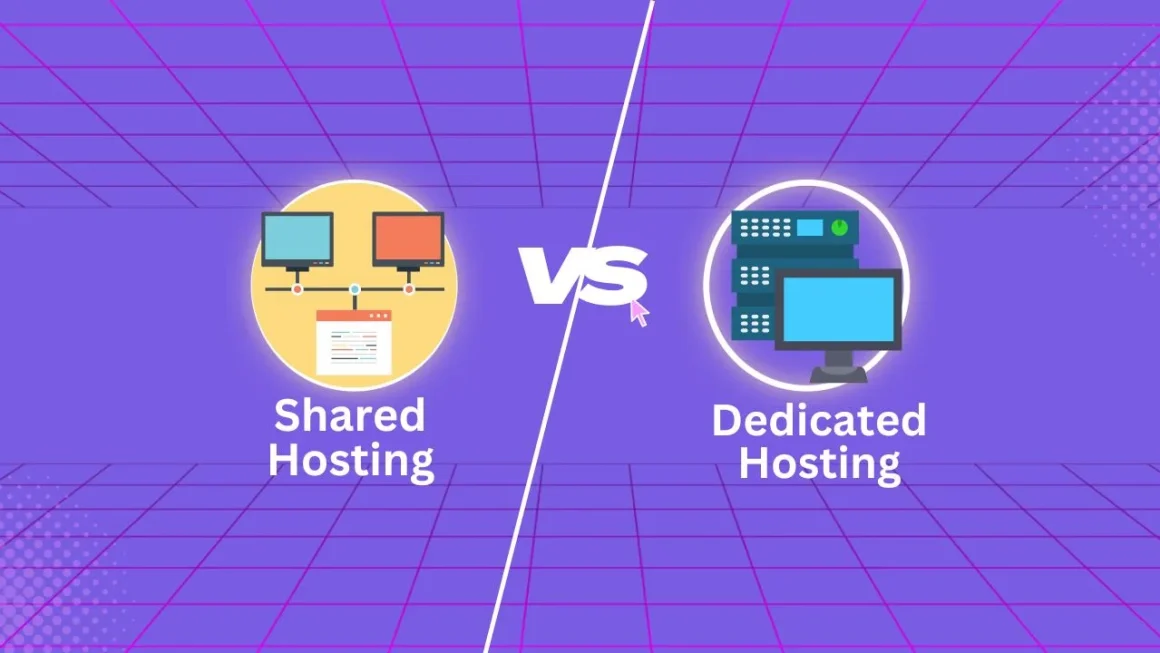Shared hosting is cost-effective and ideal for small businesses. Dedicated hosting offers better performance and security for larger enterprises.
Choosing the right hosting solution is crucial for your business’s online success. Shared hosting and dedicated hosting each have their advantages and limitations. Shared hosting is more affordable and easy to manage, making it suitable for startups and small businesses.
It involves sharing server resources with other websites, which can affect performance and security. Dedicated hosting, on the other hand, provides exclusive server resources for your business, ensuring optimal performance and enhanced security. This option is best for larger businesses with higher traffic and specific security needs. Understanding these differences helps you make an informed decision for your hosting needs.
Introduction To Web Hosting
Choosing the right web hosting is crucial for your business. Let’s dive into the basics of web hosting and its importance for businesses.
Basics Of Web Hosting
Web hosting is a service that allows your website to be accessible on the internet. It stores your site’s files on a server and delivers them to users’ browsers. Think of it as renting space on the internet for your website.
There are different types of web hosting:
- Shared Hosting: Multiple websites share the same server.
- Dedicated Hosting: One website uses an entire server exclusively.
Each type has its pros and cons. Understanding them helps you make an informed decision.
Importance For Businesses
Choosing the right web hosting impacts your business significantly. Here are some key points:
- Performance: Better hosting means faster load times.
- Security: Dedicated hosting provides more security features.
- Scalability: Choose a hosting type that can grow with your business.
Investing in the right hosting ensures your website runs smoothly. It also enhances user experience, which can lead to better customer retention.
| Feature | Shared Hosting | Dedicated Hosting |
|---|---|---|
| Cost | Lower | Higher |
| Performance | Slower | Faster |
| Security | Basic | Advanced |
| Scalability | Limited | High |
Choose wisely between shared and dedicated hosting. It will set the foundation for your online presence.
Understanding Shared Hosting
Choosing the right hosting plan is vital for your business. Shared hosting is often the first choice for many. It is cost-effective and easy to manage. Let’s dive into the specifics of shared hosting.
What Is Shared Hosting?
Shared hosting means multiple websites share one server. Each site gets a portion of the server’s resources. These resources include CPU, RAM, and disk space. Shared hosting is like renting an apartment. You share the space with others but have your own room.
Pros Of Shared Hosting
- Cost-Effective: Shared hosting is usually the cheapest option. It’s great for new businesses or small websites.
- Easy to Use: Most shared hosting plans come with user-friendly control panels. These make managing your site easy.
- Maintenance: The hosting provider handles server maintenance and updates. You can focus on your business.
- Scalability: Many shared hosting plans offer easy upgrades. As your site grows, you can upgrade to more resources.
Cons Of Shared Hosting
- Limited Resources: Resources are shared among all websites on the server. High traffic to one site can slow down others.
- Security Risks: Shared hosting is more vulnerable to security breaches. If one site gets hacked, others might be at risk.
- Performance Issues: Resource limits can affect your site’s performance. High traffic or demanding applications might need more resources.
- Less Control: Limited server customization options are available. Advanced users might find this restrictive.
Understanding Dedicated Hosting
Dedicated hosting is a type of web hosting. It provides a single server exclusively to one client. This setup allows for maximum control, performance, and security. Businesses with high traffic or specific needs often choose dedicated hosting. Understanding its benefits and downsides can help decide if it’s right for your business.
What Is Dedicated Hosting?
Dedicated hosting means renting an entire server for your website. No other sites share this server. You get full control over its resources. This includes CPU, RAM, and storage. You can configure it to meet your business needs. It’s like owning a private server without the hassle of maintenance.
Pros Of Dedicated Hosting
- Performance: Enjoy faster load times and better uptime. No shared resources mean your site runs smoothly.
- Security: Enhanced security features protect your data. Only your team has access to the server.
- Customization: Full control over server settings. Install any software or tools you need.
- Reliability: Consistent performance even during traffic spikes. Ideal for high-demand websites.
Cons Of Dedicated Hosting
- Cost: More expensive than shared hosting. Suitable for businesses with larger budgets.
- Maintenance: Requires technical knowledge. You may need a dedicated IT team.
- Scalability: Scaling up can be complex. Adding resources might require server upgrades.
Performance Comparison
Choosing between shared hosting and dedicated hosting affects your website’s performance. Here, we compare their speed, reliability, and resource allocation.
Speed And Reliability
Shared hosting means multiple websites share one server. This can slow down your site during peak times. Speed can vary based on the server load.
Dedicated hosting offers a server dedicated to your site. This ensures faster load times and consistent performance. Reliability is higher as no other sites can affect your server.
| Feature | Shared Hosting | Dedicated Hosting |
|---|---|---|
| Speed | Variable | Consistent |
| Reliability | Lower | Higher |
Resource Allocation
In shared hosting, resources like CPU, RAM, and bandwidth are shared. This can lead to resource contention, slowing down your site.
Dedicated hosting provides full access to all resources. This allows your site to handle higher traffic and complex applications.
- Shared Hosting:
- Shared CPU and RAM
- Shared bandwidth
- Limited control over resources
- Dedicated Hosting:
- Dedicated CPU and RAM
- Exclusive bandwidth
- Full control over resources
Cost Considerations
Choosing between shared and dedicated hosting involves several factors. Cost considerations play a crucial role in making the right decision for your business. Understanding both the initial investment and long-term costs can help you choose wisely.
Initial Investment
The initial investment in shared hosting is significantly lower. Shared hosting plans often start at just a few dollars per month. This makes it accessible for startups and small businesses. You share server resources with other websites, which reduces costs.
Dedicated hosting, on the other hand, requires a higher initial outlay. You rent an entire server exclusively for your website. This level of control and performance comes at a premium. Expect to pay anywhere from $100 to several hundred dollars per month.
Long-term Costs
Long-term costs for shared hosting remain relatively low. However, as your website grows, you may face limitations. Resource constraints can lead to performance issues. You might need to upgrade to a higher-tier plan, adding to the cost.
With dedicated hosting, long-term costs are more predictable. You have the same server resources available at all times. There are no surprises in performance. Although the initial cost is higher, the consistent performance can justify the expense.
| Hosting Type | Initial Investment | Long-term Costs |
|---|---|---|
| Shared Hosting | Low ($3-$10/month) | Increases with growth |
| Dedicated Hosting | High ($100+/month) | Predictable |
Security Features
Security is crucial for any business website. The choice between shared and dedicated hosting can greatly impact your site’s safety. Both options have unique security features. Let’s explore them.
Shared Hosting Security
Shared hosting involves multiple sites on one server. This setup can be less secure.
- Shared Resources: All sites use the same server resources. This can lead to vulnerabilities.
- Limited Control: You can’t install custom security software. You’re reliant on the host’s measures.
- Risk of Cross-Site Contamination: If one site gets hacked, others may be affected.
Shared hosting providers do offer some security features:
- Basic Firewalls: Protects against common threats.
- Regular Updates: Ensures the server software is up-to-date.
- SSL Certificates: Encrypts data between the server and users.
Dedicated Hosting Security
With dedicated hosting, you have an entire server for your site. This offers higher security levels.
- Full Control: Install custom security measures. Tailor the server to your needs.
- Isolated Environment: No risk from other sites. Your server is solely yours.
- Advanced Firewalls: Implement robust firewall rules. Protect against complex threats.
Dedicated hosting providers often include:
- Customizable Security Configurations: Adjust settings for optimal protection.
- Intrusion Detection Systems (IDS): Monitors for suspicious activity.
- Dedicated IP Address: Reduces the risk of IP blacklisting.
Scalability And Flexibility
Choosing between shared and dedicated hosting impacts your business’s scalability and flexibility. Understanding how each option supports growth and customization is crucial. This section will explore these aspects with a focus on growth potential and customization options.
Growth Potential
Shared hosting can limit growth due to shared resources. If other websites on the server experience high traffic, your site may slow down. This can affect your user experience and search engine rankings. Shared hosting is suitable for small businesses or startups with minimal traffic.
Dedicated hosting offers better growth potential. Your website gets exclusive access to all server resources. This ensures consistent performance even during high traffic periods. Dedicated hosting is ideal for businesses expecting rapid growth or high traffic volumes.
Customization Options
Shared hosting provides limited customization. The server settings are predefined and cannot be altered. This can be restrictive for businesses with specific technical requirements. Shared hosting is best for users with basic needs and little technical expertise.
Dedicated hosting offers extensive customization options. You can configure the server to meet your business needs. This includes installing custom software, adjusting security settings, and optimizing performance. Dedicated hosting suits businesses that require advanced technical control.
| Criteria | Shared Hosting | Dedicated Hosting |
|---|---|---|
| Growth Potential | Limited | High |
| Customization Options | Limited | Extensive |
Choosing The Right Option
Choosing between shared hosting and dedicated hosting can be daunting. Each option has its own advantages. The right choice depends on your business’s unique needs. Let’s explore the key factors to consider.
Business Size And Needs
Your business size greatly impacts your hosting choice. Small businesses often start with shared hosting. It is cost-effective and easy to manage. Shared hosting means your website shares resources with others. This works for low-traffic sites.
Larger businesses or those expecting high traffic should consider dedicated hosting. This option offers a server solely for your site. It provides better performance and security. Dedicated hosting is ideal for e-commerce sites or applications that need more resources.
Future Goals
Think about your future goals when choosing hosting. If you plan to scale quickly, dedicated hosting may be better. It offers more room for growth.
For businesses with steady growth, shared hosting might suffice initially. You can upgrade later as your needs change. Flexibility is key to adapting to future demands.
| Factor | Shared Hosting | Dedicated Hosting |
|---|---|---|
| Cost | Low | High |
| Performance | Moderate | High |
| Security | Basic | Advanced |
| Scalability | Limited | Unlimited |
Choosing the right hosting option is crucial for your business success. Assess your current needs and future goals carefully. Make an informed decision to ensure your website runs smoothly.
Frequently Asked Questions
What Is Shared Hosting?
Shared hosting means multiple websites share the same server resources. It is cost-effective but may have slower performance due to resource sharing.
What Is Dedicated Hosting?
Dedicated hosting provides a single server for one website. It offers better performance, security, and customization but is more expensive.
Which Hosting Is Better For Small Businesses?
Shared hosting is ideal for small businesses. It is affordable and easy to manage, making it perfect for limited budgets.
Is Dedicated Hosting Worth The Cost?
Dedicated hosting is worth the cost for high-traffic websites. It offers superior performance, security, and customization options.
Conclusion
Choosing between shared and dedicated hosting depends on your business needs. Shared hosting is cost-effective and great for small businesses. Dedicated hosting offers better performance and security for larger websites. Assess your specific requirements to make the best decision. Both options have their advantages, so choose wisely to optimize your online presence.





